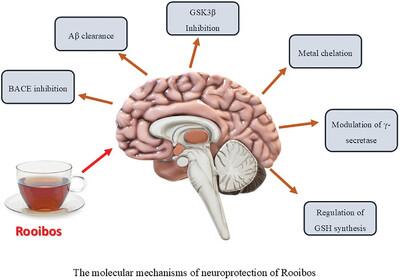The Neuroprotective Effect of Rooibos Herbal Tea Against Alzheimer's Disease: A Review
IF 4.5
2区 农林科学
Q1 FOOD SCIENCE & TECHNOLOGY
引用次数: 0
Abstract
The world is experiencing a demographic shift toward an increasing proportion of elderly persons. Alzheimer's disease (AD) and other neurological disorders are far more likely to develop as people age. AD is a gradual, irreversible, and degenerative brain disorder that progressively deteriorates memory and cognitive function, eventually leading to death. Treatment for AD is the most significant unmet clinical need in neurology. There are no effective treatment options to prevent or reverse the degenerative process. The current medical management focuses primarily on temporarily easing symptoms, with little or no overall improvement. Although genetic predisposition and lifestyle factors influence the risk of neurodegenerative disorders, recent research suggests that dietary polyphenols with solid antioxidant capacities play crucial roles in determining brain health and aging. Aspalathus linearis is used to produce Rooibos, a popular South African herbal tea, which may modulate neurodegenerative mechanisms such as oxidative stress, tau protein, amyloid plaques, inflammation, and metals, all of which have been associated with AD. We reviewed the literature to evaluate the potential neuroprotective effects of Rooibos and its major flavonoids and to understand the underlying molecular mechanisms.

路易波士凉茶抗阿尔茨海默病神经保护作用的研究进展
世界正在经历人口结构的转变,老年人的比例越来越大。阿尔茨海默病(AD)和其他神经系统疾病随着年龄的增长更有可能发展。阿尔茨海默病是一种渐进的、不可逆的、退行性的脑部疾病,它会逐渐使记忆和认知功能恶化,最终导致死亡。阿尔茨海默病的治疗是神经病学中最重要的未满足的临床需求。目前还没有有效的治疗方案来预防或逆转退化过程。目前的医疗管理主要侧重于暂时缓解症状,很少或没有全面改善。虽然遗传易感性和生活方式因素影响神经退行性疾病的风险,但最近的研究表明,具有固体抗氧化能力的饮食多酚在决定大脑健康和衰老方面起着至关重要的作用。线性Aspalathus linearis用于生产Rooibos,这是一种受欢迎的南非凉茶,可以调节神经退行性机制,如氧化应激,tau蛋白,淀粉样斑块,炎症和金属,所有这些都与AD有关。我们回顾了文献来评估路易波士及其主要类黄酮的潜在神经保护作用,并了解其潜在的分子机制。
本文章由计算机程序翻译,如有差异,请以英文原文为准。
求助全文
约1分钟内获得全文
求助全文
来源期刊

Molecular Nutrition & Food Research
工程技术-食品科技
CiteScore
8.70
自引率
1.90%
发文量
250
审稿时长
1.7 months
期刊介绍:
Molecular Nutrition & Food Research is a primary research journal devoted to health, safety and all aspects of molecular nutrition such as nutritional biochemistry, nutrigenomics and metabolomics aiming to link the information arising from related disciplines:
Bioactivity: Nutritional and medical effects of food constituents including bioavailability and kinetics.
Immunology: Understanding the interactions of food and the immune system.
Microbiology: Food spoilage, food pathogens, chemical and physical approaches of fermented foods and novel microbial processes.
Chemistry: Isolation and analysis of bioactive food ingredients while considering environmental aspects.
 求助内容:
求助内容: 应助结果提醒方式:
应助结果提醒方式:


